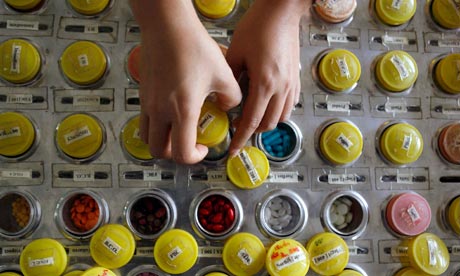
Scientists have made a breakthrough which could slow the Aids epidemic after finding that giving antiretroviral drugs to people with HIV prevents them infecting their partners.
The implications of the research, carried out in 13 countries, caused excitement among Aids campaigners and doctors. Theoretically, if every person infected with HIV was given the drug treatment early and stayed on it consistently, the epidemic could be stopped in its tracks. In 94% of cases, the partners of people with HIV in the global study were protected from the virus.
"This breakthrough is a serious game changer and will drive the prevention revolution forward," said Michel Sidibé, executive director of the Joint United Nations Programme on HIV/AIDS (UNAIDS). "It makes HIV treatment a new priority prevention option."
The results will give a massive boost to organisations such as UNAIDS which are arguing, in a time of financial constraint, that there is an urgent need to get Aids drugs to more people who need them. The protection is offered by the same drugs that are used to keep people with HIV well. Some 5 million people around the world are now on the antiretroviral drug combinations, but at least 10 million more need them.
The findings also offer hope that the stigma and discrimination attached to HIV will be lifted and more people will be willing to come forward for testing and treatment as a result. Only half of those with HIV know their status. And at present there is great fear attached to taking the test. If partners can be safeguarded in parts of the world where condom use is rare and women expect to have children, that fear may dissipate.
"People living with HIV can now, with dignity and confidence, take additional steps to protect their loved ones from HIV," said Sidibé.
The trial's early results were so conclusive that it was stopped with at least three years still to run. Funded by the US National Institute of Allergy and Infectious Diseases (NIAID), it was carried out in several countries in Africa, as well as the US, India, Thailand and Brazil. It enrolled more than 1,700 couples in which one partner had HIV but the other did not.
Those people with HIV who took part would not normally have been eligible for treatment because their CD4 count – a measure of the ability of their immune system to fight the virus – was between 350 and 550. Normally drugs are not given until the count drops below that level.
In reality, many people do not see a doctor until they have a much lower CD4 count and therefore are much sicker than the trial's participants. This means people would have to be to be tested before they fall ill and put on drugs at an earlier stage than they are now. There will be calls for more widespread testing programmes to be rolled out in the developing world.Experts also worry that those with HIV may rely on the fact they are taking antiretroviral drugs to protect those with whom they have sex. UNAIDS urges that they should still take every precaution, including using condoms and having fewer partners.
"Previous data about the potential value of antiretrovirals in making HIV-infected individuals less infectious to their sexual partners came largely from observational and epidemiological studies," said Dr Anthony S Fauci, director of the NIAID. "This new finding convincingly demonstrates that treating the infected individual – and doing so sooner rather than later – can have a major impact on reducing HIV transmission."

